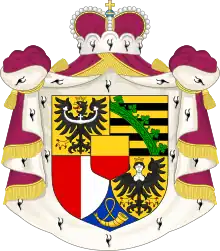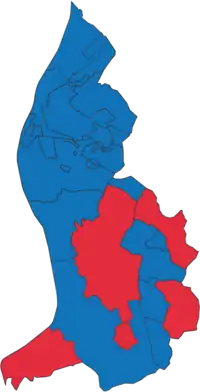| ||||||||||||||||||
All 15 seats in the Landtag 8 seats needed for a majority | ||||||||||||||||||
| Turnout | 92.59% ( | |||||||||||||||||
|---|---|---|---|---|---|---|---|---|---|---|---|---|---|---|---|---|---|---|
This lists parties that won seats. See the complete results below.
| ||||||||||||||||||
 |
|---|
General elections were held in Liechtenstein in March 1932.[1] A new electoral system was introduced in which the Landtag was elected in two rounds.[2] In the first round then members were elected, with every municipality with more than 300 inhabitants electing one member.[2][3] The second round involved the election of the remaining five Landtag members through a national vote with the whole of Liechtenstein serving as one electoral district.[2][3]
The first round of the election was held on 6 March with every municipality except Planken electing one Landtag member.[1][3] The second round was held on 13 March.[1] The result was a victory for the ruling Progressive Citizens' Party, which won 13 of the 15 seats in the Landtag.[4] This was the last election contested by the Christian-Social People's Party before it merged with the Liechtenstein Homeland Service to form the Patriotic Union.
Results
 | ||||||||
|---|---|---|---|---|---|---|---|---|
| Party | Votes | % | Seats | |||||
| Municipal | National | Total | +/– | |||||
| Progressive Citizens' Party | 8 | 5 | 13 | –2 | ||||
| Christian-Social People's Party | 2 | 0 | 2 | +2 | ||||
| Total | 10 | 5 | 15 | 0 | ||||
| Total votes | 2,173 | – | ||||||
| Registered voters/turnout | 2,347 | 92.59 | ||||||
| Source: Nohlen & Stöver, Vogt[3] | ||||||||
Municipal vote
| Municipality | Party | Elected member | |
|---|---|---|---|
| Balzers | Christian-Social People's Party | Basil Vogt | |
| Eschen | Progressive Citizens' Party | Franz Josef Marxer | |
| Gamprin | Progressive Citizens' Party | Wilhelm Näscher | |
| Mauren | Progressive Citizens' Party | Emil Batliner | |
| Ruggell | Progressive Citizens' Party | Franz Xaver Hoop | |
| Schaan | Progressive Citizens' Party | Ferdinand Risch | |
| Schellenberg | Progressive Citizens' Party | Philipp Elkuch | |
| Triesen | Progressive Citizens' Party | Adolf Frommelt | |
| Triesenberg | Christian-Social People's Party | Wilhelm Beck | |
| Vaduz | Progressive Citizens' Party | Ludwig Ospelt | |
| Source: Vogt[3] | |||
National vote
| Party | Elected member | |
|---|---|---|
| Progressive Citizens' Party | Gebhard Brunhart | |
| Progressive Citizens' Party | Peter Büchel | |
| Progressive Citizens' Party | Georg Frick | |
| Progressive Citizens' Party | Anton Frommelt | |
| Progressive Citizens' Party | Bernhard Risch | |
| Source: Vogt[3] | ||
References
- 1 2 3 Dieter Nohlen & Philip Stöver (2010) Elections in Europe: A data handbook, p1164 ISBN 978-3-8329-5609-7
- 1 2 3 Wilfried, Marxer; Frommelt, Fabian (31 December 2011). "Wahlsysteme". Historiches Lexikon. Archived from the original on 2021-02-13.
- 1 2 3 4 5 6 Vogt, Paul (1987). 125 Jahre Landtag. Vaduz: Landtag of the Principality of Liechtenstein.
- ↑ Nohlen & Stöver, p1182
